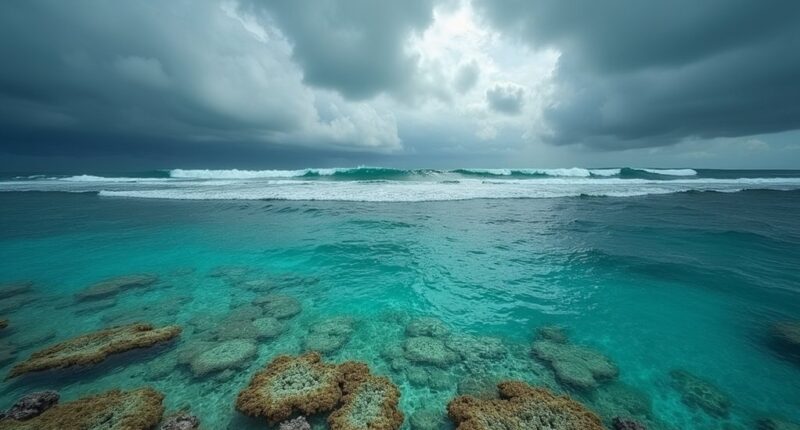Marine heatwaves are like nature’s unexpected party crashers, messing with the ocean’s ability to absorb carbon and throwing centuries of climate regulation into disarray. These heatwaves disrupt phytoplankton, the tiny heroes that convert CO₂ into oxygen, causing a decline in their productivity. Consequently, the ocean’s capacity to act as a carbon sink weakens. The balance of our ecosystem hangs by a thread. Curious about how this is all connected? There’s more to uncover about the ocean’s future!
Quick Overview
- Marine heatwaves have covered 96% of the ocean, significantly disrupting the biological carbon pump and reducing phytoplankton productivity.
- Warming oceans are less effective at absorbing CO₂, risking saturation and potentially releasing more CO₂ than they capture.
- The disruption of marine ecosystems threatens the long-term stability of carbon sequestration processes essential for climate regulation.
- Weakening ocean carbon sinks could lead to a shift from carbon storage to contributing to atmospheric CO₂ increases.
- Sustainable fisheries management and ocean practices are critical to mitigating the adverse impacts of marine heatwaves on ecosystem health.
The Rise of Marine Heatwaves and Their Global Impact
How much heat can our oceans handle before they start throwing a temper tantrum?
In August 2025, a staggering 26% of the global ocean faced marine heatwaves, with the 2023 events being the longest and widest on record—covering a jaw-dropping 96% of the ocean. Regions like the North Pacific and North Atlantic are feeling the heat, with increased intensity and duration. These heatwaves, fueled by weak winds and clear skies, are a direct consequence of climate change, affecting not just marine life but also our weather patterns. Marine heatwaves have been identified when sea surface temperature anomalies exceed the 90th percentile threshold, highlighting the severity of the situation. Furthermore, the overall decrease in marine heatwave activity in certain regions, such as the Mediterranean Sea and North Atlantic Ocean, indicates a complex interaction of factors at play. Implementing sustainable fisheries management could help mitigate some of these negative impacts on marine ecosystems already stressed by warming. If the oceans could sweat, they’d be drenched—yet they keep absorbing our excess heat.
Disruption of the Biological Carbon Pump and Its Consequences
Marine heatwaves have turned up the heat on our oceans, and the repercussions ripple far beyond the surface.
These sweltering events disrupt phytoplankton, the ocean’s tiny powerhouses that convert CO₂ into organic carbon through photosynthesis, akin to nature’s lunch prep. With less phytoplankton, the biological carbon pump falters, and zooplankton, the ocean’s grazing superheroes, struggle to do their job. As carbon export pathways get tangled, less organic matter reaches the deep ocean, where it could chill out for centuries. This disruption threatens ecosystem services that rely on healthy marine biodiversity to maintain environmental balance. Phytoplankton produce around 50-60 Pg carbon annually, and with their decline, the ocean’s capacity to sequester carbon will significantly diminish. This disruption not only affects carbon storage but also limits the pump’s ability to remove CO2 from the atmosphere, further exacerbating climate change.
The result? A cocktail of atmospheric CO₂ that could toast our climate, leaving us all a bit warmer than we’d like.
Long-Term Implications for Ocean Carbon Storage and Climate Change
The precarious balance of ocean carbon storage hangs in a delicate dance, one that could tip the scales of our climate in unexpected ways.
As warming oceans absorb less CO₂ and face potential saturation, their role as a carbon sink diminishes. This shift could transform them from a carbon ally into a foe, releasing more CO₂ than they capture. Picture a sponge that’s too full; it just can’t soak up any more. With marine heatwaves and altered ecosystems wreaking havoc, the ocean’s ability to regulate our climate hangs by a thread, urging swift action to prevent disastrous consequences. Transitioning toward sustainable ocean practices could help maintain marine ecosystem health while supporting economic activities that depend on these vital carbon sinks. Furthermore, the oceans have absorbed approximately 25% anthropogenic CO₂ since the Industrial Revolution, highlighting their crucial role in climate regulation. This study reveals a potential weakening of the ocean’s ability to store carbon, which could drastically alter future climate scenarios.









